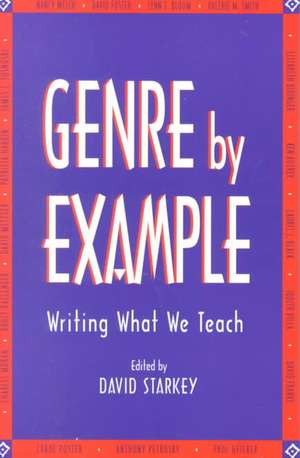Genre by Example: Writing What We Teach
Autor David Starkey, Starkeyen Limba Engleză Paperback – 31 ian 2001 – vârsta de la 18 până la 21 ani
Preț: 327.06 lei
Nou
Puncte Express: 491
Preț estimativ în valută:
62.60€ • 64.51$ • 52.85£
62.60€ • 64.51$ • 52.85£
Carte indisponibilă temporar
Doresc să fiu notificat când acest titlu va fi disponibil:
Se trimite...
Preluare comenzi: 021 569.72.76
Specificații
ISBN-13: 9780867095746
ISBN-10: 0867095741
Pagini: 192
Dimensiuni: 151 x 230 x 10 mm
Greutate: 0.27 kg
Editura: Heinemann Educational Books
ISBN-10: 0867095741
Pagini: 192
Dimensiuni: 151 x 230 x 10 mm
Greutate: 0.27 kg
Editura: Heinemann Educational Books
Descriere
Peter Elbow claims that "a good essay or biography requires just as much creativity as a good poem; and . . . a good poem requires just as much truth as a good essay." The contributors to Genre by Example would agree. Their book argues that creativity need not be muted simply to meet the perceived boundaries of the academic essay, that, in fact, an author immersed in a form has special insight unavailable through any other means. The authors all implicitly endorse the contention that we know best by doing.
Too often, writing theorists prescribe rules for their students and fellow teachers without providing any evidence that they themselves can comply with their own prescriptions. The contributors to Genre by Example are not evasive in this way. "Practice what you preach" might well be the book's ultimate pedagogy, a philosophy the contributors have embraced. They not only tell, they show. Bound by the conventions of a genre, they are better able to understand and explain the limitations, difficulties, and pleasures inherent in that genre. And the contributors find themselves saying exactly what they mean rather than engaging in jargon that is impressive and meaningful chiefly to academics.
Ultimately, the contributors' approach to the book's central concept has been limited by their knowledge that the readers will be primarily composition teachers, with instructors of creative writing and literature survey courses as secondary audiences. Genre by Example assumes these readers will welcome imaginative approaches to writing, but will also need to incorporate these ideas into their own classes. To that end, nearly every chapter offers specific, practical applications.
Too often, writing theorists prescribe rules for their students and fellow teachers without providing any evidence that they themselves can comply with their own prescriptions. The contributors to Genre by Example are not evasive in this way. "Practice what you preach" might well be the book's ultimate pedagogy, a philosophy the contributors have embraced. They not only tell, they show. Bound by the conventions of a genre, they are better able to understand and explain the limitations, difficulties, and pleasures inherent in that genre. And the contributors find themselves saying exactly what they mean rather than engaging in jargon that is impressive and meaningful chiefly to academics.
Ultimately, the contributors' approach to the book's central concept has been limited by their knowledge that the readers will be primarily composition teachers, with instructors of creative writing and literature survey courses as secondary audiences. Genre by Example assumes these readers will welcome imaginative approaches to writing, but will also need to incorporate these ideas into their own classes. To that end, nearly every chapter offers specific, practical applications.
Cuprins
Managed Care, N. Welch
Destructive Innocence, D. Foster
Teaching Each Other to Write Autobiography, L. Bloom ,
Smith & E. Bidinger
Entries into Teaching with Journals, K. Autrey
Resurrection and the Return with the Elixir, L. Black & J. Villa
Writing as Teaching, D. Franke
Professor Moran, English 113 Section 11, and the Quick-Write, C. Moran
The Importance of Writing Badly, B. Ballenger
A Dialogue on Dialogues, D. Metzger
Arguing Is a Cultural Practice, P. Harkin & J. Sosnoski
Letter Writing, C. Poster
In(side) Out(ing), A. Petrosky
Teaching Postmodern Fiction to Creative Writing Students, D. Starkey
B, Box, Beast, Beyond, P. Heilker
Destructive Innocence, D. Foster
Teaching Each Other to Write Autobiography, L. Bloom ,
Smith & E. Bidinger
Entries into Teaching with Journals, K. Autrey
Resurrection and the Return with the Elixir, L. Black & J. Villa
Writing as Teaching, D. Franke
Professor Moran, English 113 Section 11, and the Quick-Write, C. Moran
The Importance of Writing Badly, B. Ballenger
A Dialogue on Dialogues, D. Metzger
Arguing Is a Cultural Practice, P. Harkin & J. Sosnoski
Letter Writing, C. Poster
In(side) Out(ing), A. Petrosky
Teaching Postmodern Fiction to Creative Writing Students, D. Starkey
B, Box, Beast, Beyond, P. Heilker
Notă biografică
David Starkey teaches at Santa Barbara City College and was a Fulbright Professor of English at the University of Oulu, Finland, in 1999.
